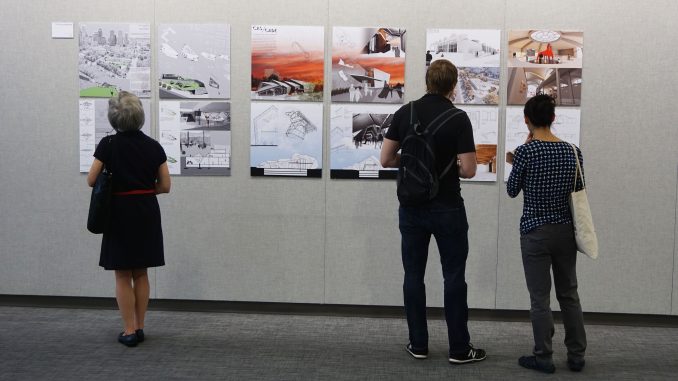
Wendy Sumida realized how little people know about architecture from the sitcom “How I Met Your Mother.”
A friend of Sumida’s once asked her, “Can you tell me more about architecture? The only thing I know is from what I’ve seen on ‘How I Met Your Mother,’” referring to Ted Mosby, a lead character on the show who is an architect.
On Saturday, Sumida, an adjunct architecture professor, and her husband Dave spoke about reality television’s depiction of architecture in the Architecture Building on Main Campus. The two co-founded the architecture and design firm Via Laulima two years ago. In their lecture, “Architects: Behind the TV Magic,” the couple discussed how home improvement shows impact the public’s perception of architecture. They also shared what it takes to be an architect.
The lecture is one of a series of events as part of the 13th annual DesignPhiladelphia Festival. The 10-day festival is hosted by the Center for Architecture and Design, an independent non-profit founded by the Philadelphia Chapter of the American Institute of Architects in 2002. DesignPhiladelphia, its signature festival, runs until Saturday and comprises 130 events covering all disciplines of design, like fashion, technology and architecture.
Wendy Sumida displayed design boards made by several undergraduate and graduate students at her lecture.
“What I enjoy about architecture is knowing the impact that people don’t realize, playing this backstage role,” said Mary Stiger, a graduate architecture student who had a design board on display at the lecture.
Venues like universities, cultural institutions and retailers host events, which include panel discussions, fashion shows, workshops and design exhibitions, according to the festival’s website.
“Participants range from internationally known designers to local designers,” said Sharon Leshner, the community outreach and communications coordinator for the Center of Architecture and Design.
For Wendy Sumida, it was a combination of teaching and architecture that sparked her idea for the lecture. One-hour home improvement shows create “a distorted sense of reality” and reveal how little the general public knows about what it takes to build something, she said.
During the lecture, Wendy Sumida said homeowners on reality TV receive materials at a discounted rate, which makes renovation totals inaccurate when compared to real life costs.
“It’s an eye-opening experience for clients,” Wendy Sumida said. “Many don’t fully understand the process.”
“The architect is rarely even mentioned on these shows,” Dave Sumida added. “Through the lecture, we hope to help people understand the larger process and role architecture plays.”
He said the proliferation of home-improvement shows has led to a “recent shift” in the mindset of residential clients. Wendy Sumida said her clients underestimate turnaround times to be as quick as those on reality TV, where construction time is edited out.
Wendy and Dave Sumida’s lecture was one of many events Leshner planned as part of the festival’s steering committee. This year, Leshner said the committee aimed for DesignPhiladelphia to promote Philadelphia as a design hub of influence and open economic opportunities for local designers.
“It is the one time when the design community can come together,” Leshner said. “Through this event, you can really see how much good design is here in Philly.”
Philadelphia’s prominent design scene is exactly what brought Wendy Sumida to the East Coast. After attending California Polytechnic State University for her undergraduate architecture degree, she came to Philadelphia to earn her master’s in architecture at the University of Pennsylvania.
But her love of architecture developed much earlier.
Born in Taiwan, Wendy Sumida and her family moved to Southern California to live with her grandparents when she was 5 years old. Years later, as her family began looking for a house of their own, she said she fell in love with the experience of searching for a home.
“I could go into a space and picture myself turning a room into my own, something to call ours,” Wendy Sumida said. “The fact that someone designed that, I wanted to do that for others.”
This memory inspires her to share architecture with others, both as a professor and a professional architect. Her favorite part of teaching, she said, is seeing students grow.
Wendy Sumida currently teaches third-year studio classes in the architecture department in the Tyler School of Art. Students in the department learn about the social aspects of architecture, including its impact on the community, Wendy Sumida said.
She also teaches her clients about the importance of architecture at her firm Via Laulima, which is a Hawaiian phrase that means “by way of many hands working together.” Wendy Sumida said this name is a reflection of the diversity of the firm’s work, which encompasses the fields of architecture, interior design, furniture design and spatial branding, a way to create a connection with a culture by experiencing a designed space, Wendy Sumida said.
“It’s all about collaboration and how we seek out answers in design,” she added.
Wendy Sumida and her husband were excited to share the behind-the-scenes aspects of architecture and design with students and other listeners.
“The best compliment we can receive is that the work we’ve done has improved the quality of life of our client,” Wendy Sumida said. “We are hoping to cause a ripple effect of knowledge by really explaining who we are and what we do.”



Be the first to comment